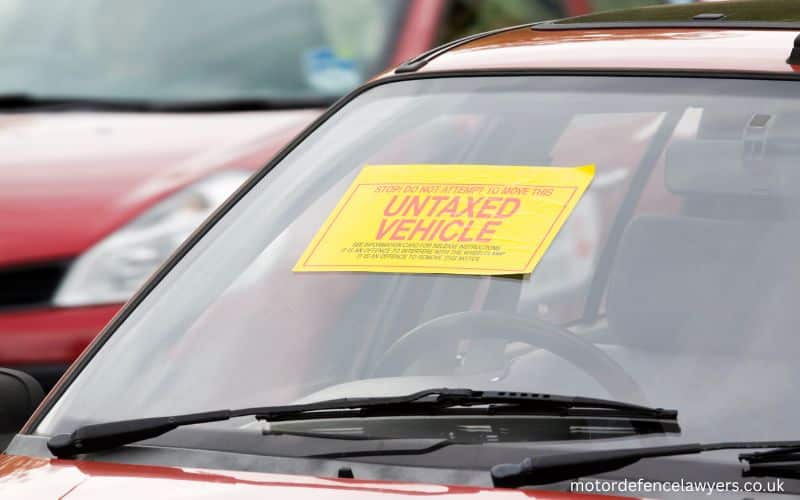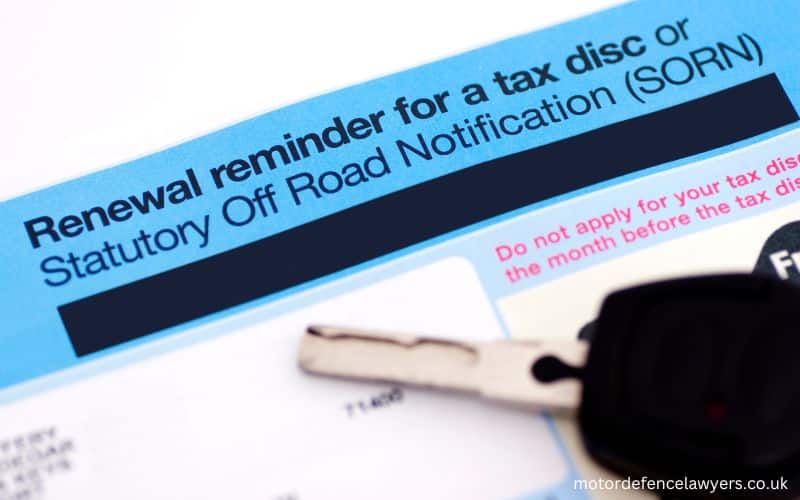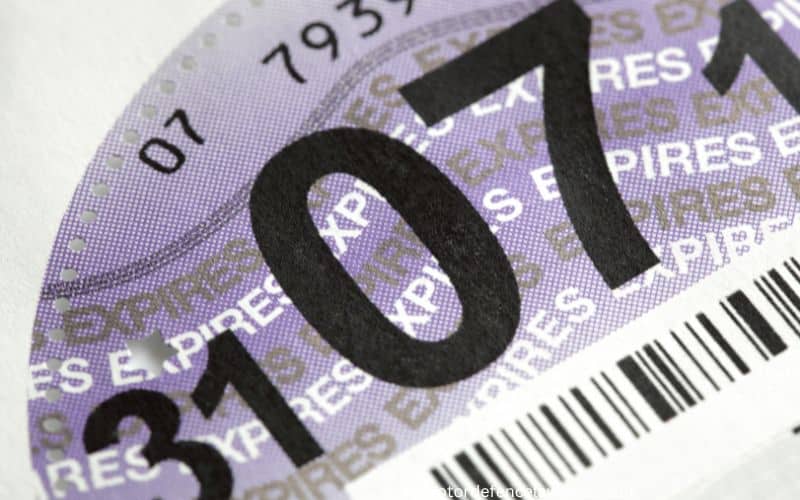Why Choose Us
- Ranked in the top 20 law firms by Trustpilot
- Nationwide Legal Coverage
- Free Consultation
- Fixed Fee Terms
- Competitive Rates
- Flexible Payment Plans
- Trusted Legal Care
- UK’s Leading Motoring Solicitors
4.8 out of 5
Our customers rate us
“EXCELLENT”
AS SEEN ON

12.12.2022
Caught Driving Without Tax – Here’s What Happens Next

Driving without car tax is an offence in the UK. There are a few exceptions, but generally, if you use a UK-registered vehicle on public roads, you must pay road tax. Making sure your car is taxed is an annual requirement for registered keepers of all vehicles on UK roads. You must complete the process even if you don’t have to pay. If your car is not used on the road and you don’t want to pay the tax, you must notify the DVLA and register your car as SORN. (Statutory off-road notification).
Caught driving without tax? We can help
Send us a message or call us on 0333 443 2366 for friendly advice
Car tax, road tax or Vehicle Excise Duty (VED) are all the same thing. The money goes to the government and contributes towards maintaining roads and motorways in the UK.
When you buy a new car, you must ensure it is taxed before driving it. Often, if you buy from a dealer, the tax might be included in the price. The dealer will usually sort out the tax before you collect the car. Ultimately, however, your responsibility is to ensure the vehicle is taxed.
If you buy a second-hand car, you need to tax the vehicle before driving it – the remaining time on the tax period does not carry over to a new owner.
When buying a second-hand car, you need to get the V5C registration certificate from the previous owner to register the car. You can use that form to tax your vehicle online before you drive away. You can also register and pay at the Post Office.
You can choose your instalment period – making payments every month, or at six or twelve-month intervals. There is a surcharge if you don’t pay off-off annually.
All vehicle and tax details are stored on the DVLA (Driver and Vehicle Licensing Agency) database. The DVLA will send you a renewal notice with instructions on how to renew your tax.
This database is checked monthly, making it very difficult to avoid paying taxes.
The tax rate is higher in the first year a car is registered than in subsequent years. The vehicle’s fuel type and carbon dioxide emissions determine the initial rate. Cars with the highest emissions can pay over £2,200 in their first year. Vehicles with zero emissions often don’t have to pay car tax.
The tax rate is also higher for vehicles with a higher list price. There is an additional fee if the list price is more than £40,000.
From the second year, the tax rate is lower. It is determined by whether your car uses petrol, diesel, electric or a hybrid.
The year the car was registered is also relevant.
Caught driving without tax? We can help
Send us a message or call us on 0333 443 2366 for friendly advice
No, there is no grace period for unpaid road tax. Since registration and renewals can be done online, there is no need for a grace period. You can pay online in the month your car tax is due, from the 5th of that month.
If you choose to renew your tax through the post office, you can renew it two months before expiry. You must include the following:

Penalties are determined by The Vehicle Excise and Registration Act 1994 (VERA).
Previously, police had to stop you and check your tax disc on the windscreen. These days the police use Automatic Number Plate Recognition (ANPR) cameras and compare number plates with the DVLA database.
When talking about car tax, we need to understand that there is a difference between registering for tax and having to pay tax.
All vehicle owners must register and apply for car tax. Some vehicles or drivers are exempt and will not have to pay tax.
Caught driving without tax? We can help
Send us a message or call us on 0333 443 2366 for friendly advice
Chancellor Jeremy Hunt, however, recently announced that from 2025, electric car owners would have to pay road tax. New zero-emission cars registered on or after 1 April 2025 will pay VED like all other road users.
You may drive an untaxed car to a pre-booked MOT test. You cannot tax your vehicle without a valid MOT, hence the exemption. To rely on this exemption, you must have proof of your appointment and drive straight to the MOT garage.

Many insurance policies state that your policy will be invalid if you drive your vehicle without tax. This would mean that you will be personally liable for all damages and injuries should you be involved in a car accident. Check with your insurer!
In addition, driving without tax can end up as a criminal conviction which could impact your ability to take out car insurance in future. If you can get insurance, your premiums might be much higher.
On the flip side, you cannot tax your car without valid motor insurance.
Yes, anyone can use the government website to check if car insurance is up to date. If you use someone else’s car, you are expected to check that the vehicle complies with the law, even if you are not the registered keeper.
This means a neighbour or co-worker can check your car’s tax status and report you if your vehicle is not taxed.
To check a car’s status, you need the registration number.
If you want to take your vehicle off the road, you must inform the DVLA and register a SORN. You must do more than simply cancel your licence. You can SORN your car online or at the Post Office. If you still have tax left for the tax period, you may be able get a refund for the remaining tax.
Once registered as SORN, you do not have to pay tax. When you want to take your car back on the road, you must tax it before using it on the roads.
Yes, any vehicle kept on a public road is subject to tax, even if it is just parked and not driven. If you are keeping it on private property and not driving the vehicle, it must be registered as SORN if you want to avoid paying tax.
You can cancel your tax if your car is an insurance write-off, stolen or declared SORN. If your sell your car, you must inform the DVLA of the new owner’s details.
Car tax is not transferable. You can get a refund on any full month’s tax that you’ve paid.
Road tax contributes to the upkeep of roads in the UK. If you are a vehicle’s registered keeper, you are responsible for road tax. It is worth keeping up to date with your road tax since penalties for driving without tax can be substantial.
If you are caught driving without tax, you should speak with a lawyer to discuss if there are any mitigating factors in your favour.
Caught driving without tax? We can help
Send us a message or call us on 0333 443 2366 for friendly advice
Why Choose Us
We have been successfully representing clients in motoring courts nationwide
Contact us for a free consultation, our expert solicitors will be able to discuss your case and advise on legal options.
Birmingham
Bradford
Bristol
Carlisle
Cardiff
Chelmsford
Huddersfield
Hull
Manchester
Liverpool
Leeds
London
Newcastle
Norwich
Nottingham
Sheffield